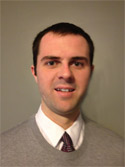February 13, 2012
Religion’s role in politics will be discussion topic
CARBONDALE, Ill. -- There is an old adage that religion and politics do not mix.
A discussion at Southern Illinois University Carbondale looks to debunk that theory, and also provide insight into religion’s role in the 2012 presidential election.
The Rev. Ryan Burge, senior pastor at First Baptist Church in Mount Vernon and a post-doctoral fellow at the Paul Simon Public Policy Institute, will look at several issues at 5 p.m., Thursday, Feb. 16, in the Institute lobby, 1231 Lincoln Drive, in the old U.S. Forest Service building. Burge will discuss what it means to be religious from a social science perspective, examine the religious backgrounds of each candidate in this year’s Republican presidential primary, and talk about exit polls results in primary states where voting has taken place.
Media Advisory
Reporters, photographers and camera crews are welcome to attend the “Pizza and Politics” session with the Rev. Ryan Burge. For more information, contact Matt Baughman, associate director, at 618/453-4009, or 618/201-0082.
The presentation is part of the Institute’s “Pizza and Politics” series. The event is free, but Institute officials encourage registration. To register, contact Institute project coordinator Carol Greenlee at 618/453-4078, or by email at cgreenlee@siu.edu.
Burge is “uniquely qualified to understand and explain the ever-evolving role of religion in American politics,” said David Yepsen, Institute director. “His session will help people better understand the influences at work in the 2012 campaign and how they might affect the outcome.”
Burge earned his master’s degree and doctorate in political science from SIU Carbondale. He works at the Institute on issues that deal with poll construction, question wording and data analysis, and is also involved in an Institute paper that focuses on Tea Party support in Illinois. Burge said he is also using data from an Institute poll of Illinois voters to write a paper on the demographic and religious factors that lead to support for reform proposals in the state.
Religion “has always played an important role” in American politics, Yepsen said, noting the nation’s founders came to flee religious persecution. Other topics in the nation’s history including slavery, temperance, the anti-war and civil rights movements, and the work of the “religious left” and “religious conservatives” brought together issues of religion and politics, Yepsen said.
This year, Yepsen said, there is some issue involving religion and its possible impact on the presidential campaign nearly every day. The topics range from the influence of social conservatives in the Republican presidential race, Mitt Romney’s faith, a recent federal appeals court ruling striking down California’s ban on same-sex marriage, and the decision by President Barack Obama’s administration requiring Catholic institutions to offer health insurance that covers contraception.
“Ryan’s presentation will help us understand the impact these will have on the election,” he said.
Burge said it is cliché for commentators and candidates to say this election is “a historic one or the most important,” because the mantra has been part of every election in the nation’s history.
“This election is interesting from my perspective because I don’t really think the impact of religion will be nearly as significant in the general election as it is in the Republican primaries,” he said. “Those who vote in primaries are highly motivated individuals who are often ideologues. Many are passionate about a single issue. This gives the religious dimension a large importance in the primaries.”
While many might favor Republican candidate and former Pennsylvania Sen. Rick Santorum because of his stance on social issues, “it seems highly unlikely that Barack Obama will win or lose based on his position on gay marriage or abortion,” Burge said.
“It will be about the economy, period,” Burge said. “This election is a referendum on how Obama has guided his way through the economic downturn and recovery. That was not the case in 2004, which focused on foreign policy or 2000, which had a much larger focus on social issues.”
Burge hopes his presentation will illustrate that specificity, when it comes to religion and voting trends, is problematic.
“I hope the next time they hear on the news that 45 percent of evangelicals went for (Newt) Gingrich in South Carolina they realize the measure of evangelical is imperfect,” he said. “I hope they begin to understand how hard it is to measure something so fluid as religious affiliation or belief. One of the hardest things social scientists do is define things, and defining religion is particularly problematic.”
Burge has nearly 10 years of service to the American Baptist Church, including time as a pastor at Warder Street Baptist Church in Marion, and as youth pastor at First Baptist Church in Centralia. Burge has a bachelor’s degree in history-political science from Greenville College, where he also minored in religion.

